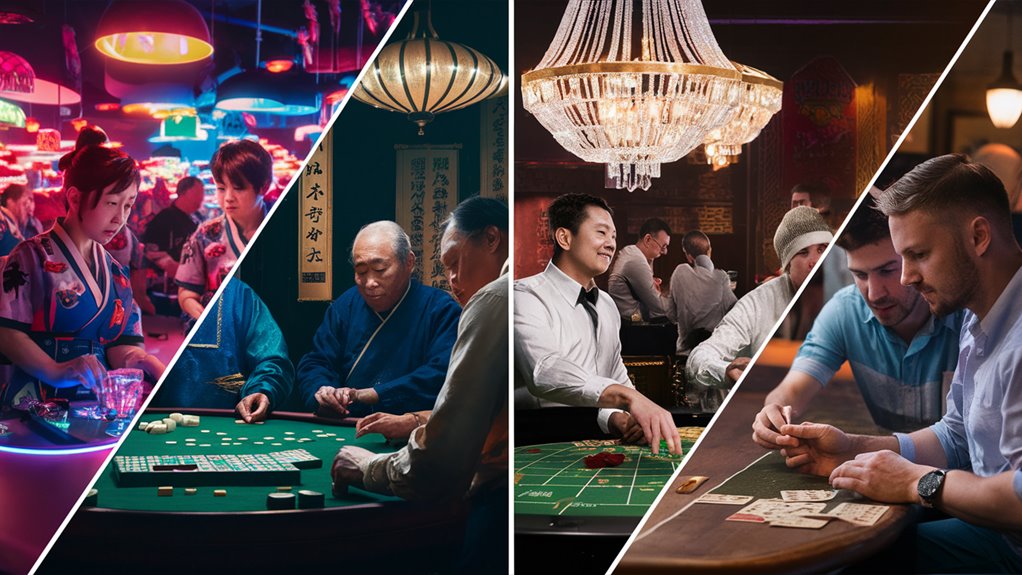
How Do Cultural Differences Impact Global Gambling Behaviors?
#
Key Takeaways
- Cultural beliefs and traditions directly shape gambling preferences across different regions
- Social structures influence risk-taking attitudes and gaming choices
- Understanding cultural nuances is essential for navigating global gaming markets
Gambling patterns and preferences vary significantly across cultures, reflecting deep-rooted societal values and historical traditions. Each region’s unique approach to gaming emerges from centuries of cultural evolution, creating distinct gambling landscapes worldwide.
Regional Gaming Preferences
- Japan: Pachinko parlors dominate, reflecting collective gaming experiences
- United States: Casino-style gambling with emphasis on individual competition
- Asia Pacific: Traditional table games with strong social elements
- Europe: Sports betting and lottery systems integrated into daily life
Cultural Factors Affecting Gambling Choices
- Religious Beliefs
- Influence on game selection
- Impact on gambling frequency
- Role in regulatory frameworks
- Social Structure
- Family values and gambling participation
- Community attitudes toward risk-taking
- Collective vs. individual gaming preferences
- Historical Context
- Traditional games and their modern evolution
- Legislative development
- Social acceptance levels
Market Implications
As global gaming markets continue to expand, understanding these cultural distinctions becomes increasingly crucial for:
- Market entry strategies
- Game development and adaptation
- Regulatory compliance
- Customer engagement approaches
This cultural diversity in gambling creates unique opportunities and challenges for operators while enriching the global gaming landscape with varied traditions and practices.
Historical Origins of Regional Gaming
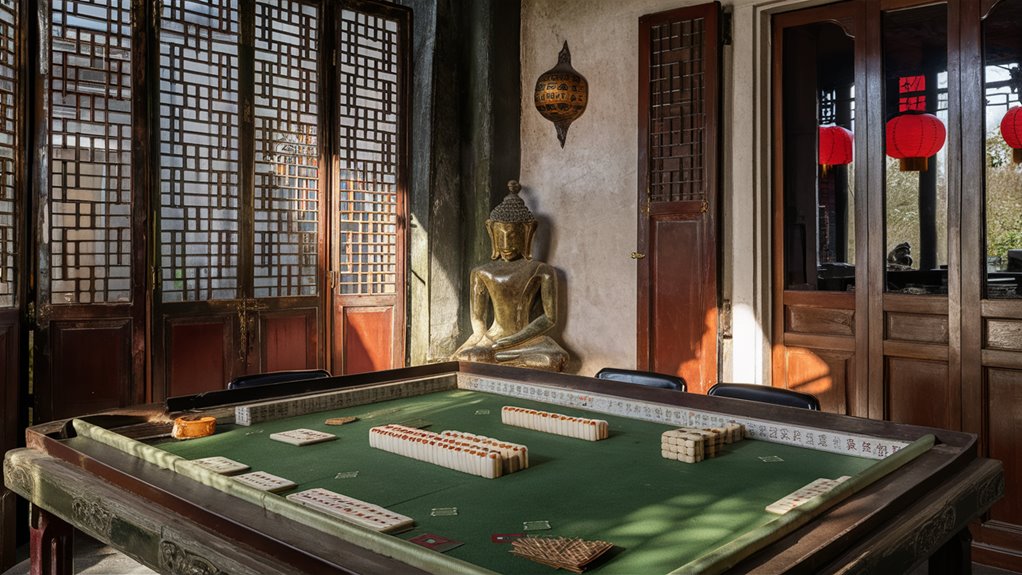
How Did Ancient Civilizations Shape Today’s Regional Gaming Preferences?
Key Takeaways
- Ancient Chinese gambling traditions heavily influence modern East Asian gaming preferences
- Greek and Roman betting customs formed the foundation of European casino games
- Native American gaming practices shaped North American gambling landscapes
Ancient Origins of Regional Gaming Traditions
Ancient China pioneered organized gambling through games like Keno and tile-based activities, directly influencing modern East Asian gaming preferences.
The Greeks and Romans established Europe’s gambling foundation through dice games and sports betting, while Native American tribes developed stick and bone games that would later impact North American gaming culture.
Regional Gaming Evolution
Modern casinos reflect these historical patterns distinctly:
- East Asian venues: Predominance of baccarat and pai gow
- European establishments: Focus on roulette and dice-based games
- North American casinos: Integration of tribal gaming influences
Cultural Gaming Legacy
These historical foundations continue shaping regional preferences:
- China’s Mahjong has evolved into multiple variants across Asia
- European card games have achieved global reach
- Native American tribal gaming maintains significant influence in North American casino operations
Modern Impact of Ancient Gaming
Regional gaming preferences demonstrate clear historical lineage:
- Asian markets favor traditional tile-based games
- European venues emphasize chance-based table games
- North American casinos blend multiple cultural influences
This cultural diversity in gaming preferences stems directly from ancient civilizations’ unique approaches to gambling and entertainment, creating the distinct regional characteristics visible in today’s gaming industry.
Religious Influences on Gambling Practices
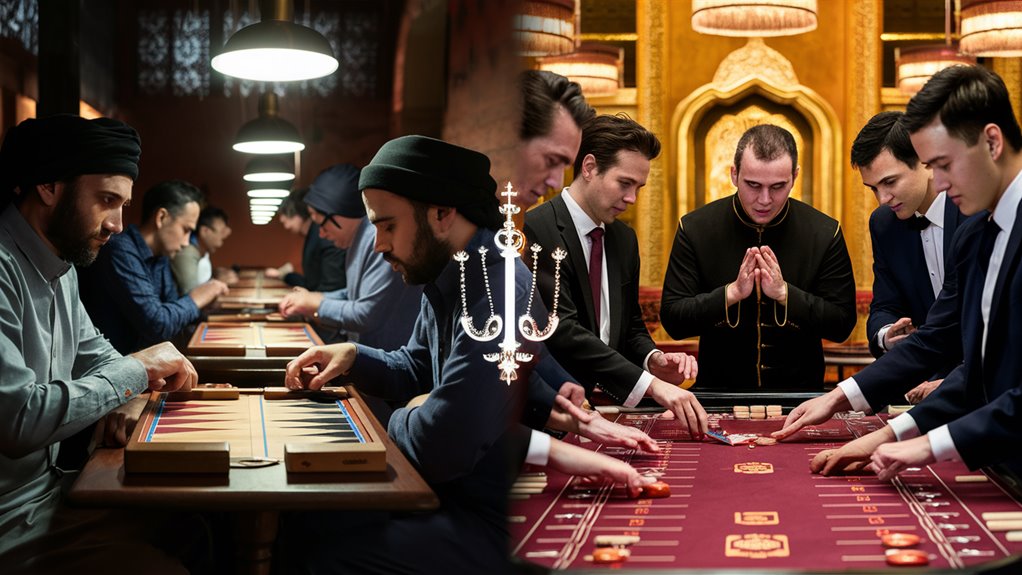
How Do Religious Beliefs Impact Global Gambling Practices?
Key Takeaways
- Religious doctrines significantly shape gambling regulations and social acceptance worldwide
- Islamic law strictly prohibits gambling, while Buddhist regions show more flexibility
- Christian denominations differ widely in their approach to gambling activities
- Cultural interpretations of religious texts influence modern gaming policies
Islamic Perspectives
Islamic law explicitly prohibits gambling (maisir), resulting in complete bans across most Muslim-majority nations.
This strict prohibition stems from religious teachings that view gambling as harmful to both individual and societal well-being.
Buddhist Influences
Buddhism’s middle-path philosophy creates a more nuanced approach to gambling in Southeast Asian countries.
Rather than outright prohibition, Buddhist-majority regions often implement regulated gaming practices that align with moderation principles.
Christian Denominational Differences
Protestant and Catholic traditions demonstrate contrasting views on gambling:
- Protestant denominations generally oppose gambling activities
- Catholic regions show greater tolerance, often incorporating gaming into community events
- These differences reflect in northern versus southern European gambling regulations
Jewish Traditional Views
Judaism takes a pragmatic stance on gambling:
- No explicit prohibition exists in Jewish law
- Gambling faces disapproval when interfering with work or family duties
- Modern Jewish communities often regulate rather than ban gaming activities
Hindu Perspectives
Hindu traditions present a balanced approach to gambling:
- Ancient texts acknowledge gambling’s potential dangers
- Modern Hindu-majority societies maintain moderate positions
- Cultural practices often blend traditional caution with contemporary gaming
Modern Policy Impact
Religious influences continue shaping:
- National gambling legislation
- Social acceptance levels
- Gaming industry regulations
- Regional participation rates
- Casino operation guidelines
- Lottery system implementations
These religious frameworks remain crucial in determining how different societies approach and regulate gambling activities in the contemporary world.
Eastern Vs Western Betting Styles
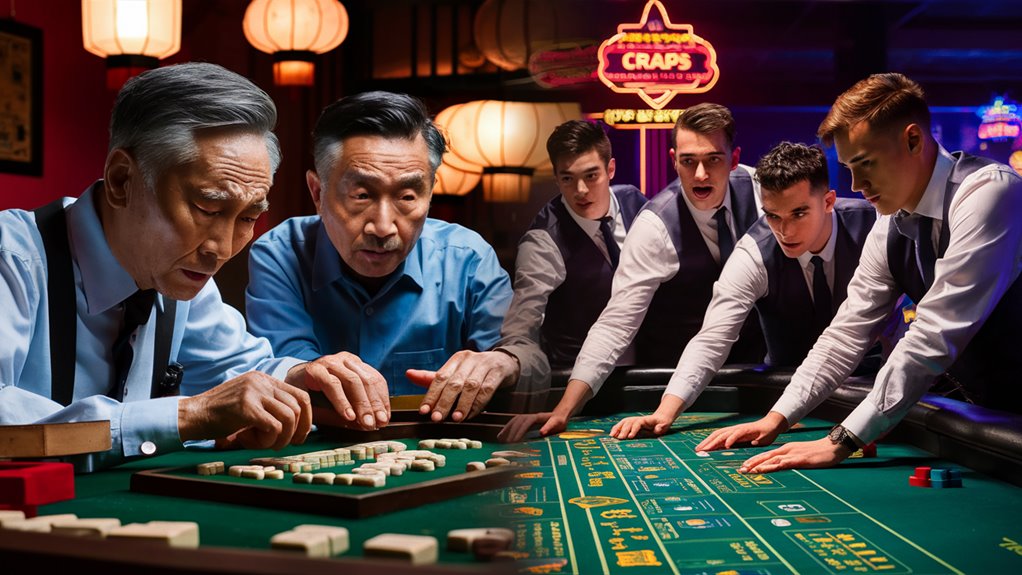
How Do Eastern and Western Gambling Styles Differ?
Key Takeaways
- Eastern gambling emphasizes skill-based games and social interaction
- Western betting focuses on chance-based games and individual play
- Cultural values significantly influence gambling preferences and behaviors
Eastern Gaming Traditions
Eastern gambling cultures prioritize strategic gameplay and social connections through games like Mahjong and tile-based competitions.
Players develop advanced pattern recognition skills and mathematical probability understanding while building relationships with fellow participants.
The emphasis on numerology and cultural superstitions plays a crucial role in betting decisions.
Western Gambling Approaches
Western betting styles gravitate toward games of chance, including slot machines, roulette, and lottery systems.
These games typically offer immediate results and require minimal strategy, appealing to players seeking quick entertainment.
Statistical probability and individual outcomes drive most betting decisions, with less emphasis on social dynamics.
Key Differences in Social Aspects
- Eastern gambling:
- Group-oriented activities
- Relationship building
- Strategic skill demonstration
- Cultural symbolism integration
- Western gambling:
- Individual-focused activities
- Entertainment-driven
- Chance-based outcomes
- Statistical probability focus
Cultural Influences on Betting
Eastern players incorporate traditional beliefs and superstitions into their gambling practices, viewing gaming as an opportunity to demonstrate wisdom and strategic thinking.
Western gamblers typically approach betting as pure entertainment, focusing on potential payouts and individual achievement rather than social or cultural significance.
Economic Factors Across Cultures
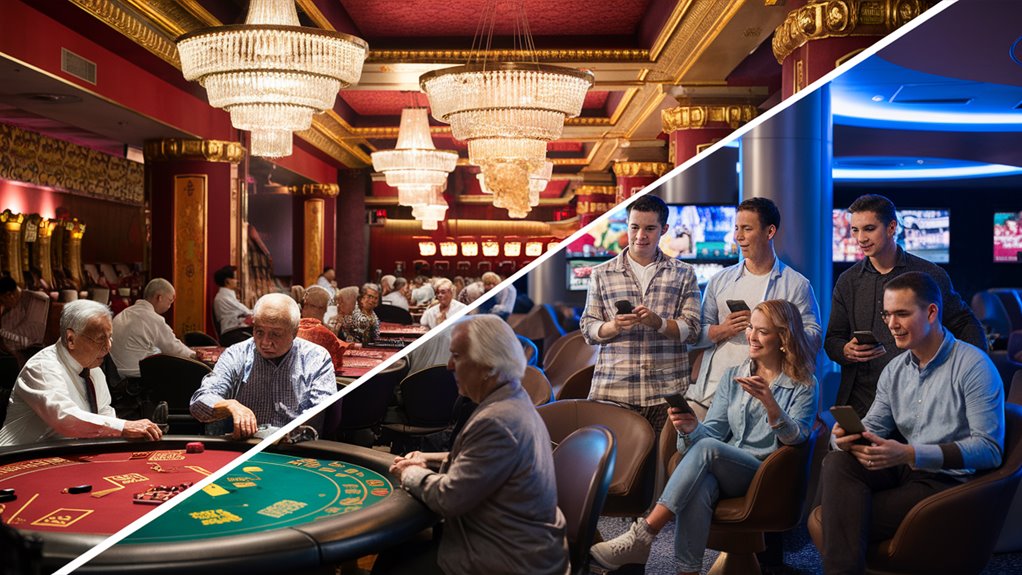
How Do Economic Factors Impact Gambling Behavior Across Different Cultures?
Key Takeaways
- Income levels directly influence gambling preferences and risk tolerance
- Developed nations spend larger amounts but smaller income percentages on gambling
- Currency strength affects platform choice and betting patterns
- Cultural wealth gaps create distinct gambling market segments
Income Levels and Betting Patterns
Economic status significantly shapes gambling preferences across different societies.
Developing nations typically favor low-stakes games and informal betting activities, while affluent countries gravitate toward structured, high-stakes gambling ventures.
This pattern reflects both financial capabilities and risk management approaches across economic divides.
Wealth Distribution Impact
Markets with significant wealth disparities demonstrate distinct gambling segments:
- High-roller venues serving affluent players
- Street-level betting for working-class participants
- Middle-market casinos catering to average income earners
Currency Considerations and Platform Choice
Currency strength influences gambling behavior in several ways:
- Weak currency regions seek international platforms
- Multi-currency options attract global players
- Exchange rates affect betting amounts and strategies
Spending Patterns by Economic Development
Economic development levels create clear gambling expenditure patterns:
- Developed nations: Higher absolute bets, lower percentage of income
- Emerging economies: Lower absolute bets, higher percentage of income
- Middle-income countries: Moderate stakes, balanced approach
This economic-cultural interplay shapes not only betting preferences but also risk tolerance levels and gambling platform choices across different societies.
Traditional Games Around the World
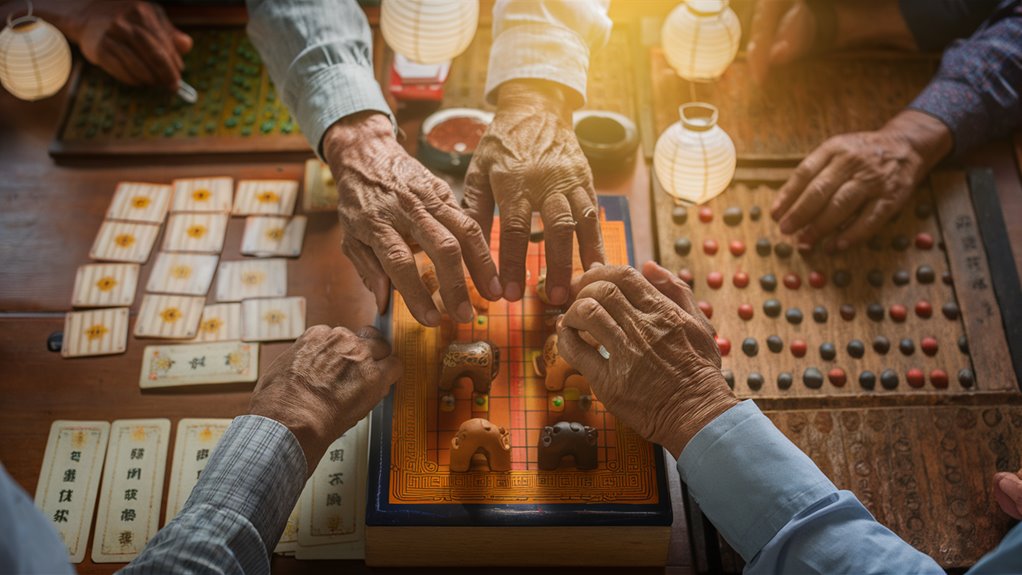
What Are The Most Fascinating Traditional Games From Around The World?
Key Takeaways
- Traditional games reflect cultural values and social structures across different societies
- Many ancient games have evolved into modern variations still played today
- These games combine strategy, skill, and social interaction while preserving cultural heritage
Traditional games showcase rich cultural heritage across continents and centuries.
In China, Mahjong remains a cornerstone of social gatherings, where players develop strategic thinking while strengthening family bonds.
India’s ancient Pachisi, the predecessor to modern Parcheesi, continues to bring communities together during festivals and celebrations.
Cultural Significance and Regional Variations
Native American territories feature traditional stick games that blend competitive play with spiritual practices, demonstrating how games often transcend pure entertainment.
Across Africa, various Mancala games challenge players’ mathematical abilities while teaching important planning skills.
Historical Evolution
The Middle East contributed Trictrac, which evolved into modern backgammon, demonstrating how merchants and nobles have passed down gaming traditions through generations.
In Southeast Asia, traditional competitive games have adapted to modern regulations while maintaining their cultural significance.
European Influence
European gaming traditions, particularly in France, gave rise to strategic card games like Trente et Quarante, which spread throughout the continent.
These games serve as living artifacts, offering insights into:
- Mathematical understanding of different cultures
- Social structures and hierarchies
- Community values and traditions
- Historical development of strategic thinking
- Cultural exchange between societies
These traditional games continue to bridge generations while preserving unique cultural elements of their origins.
Social Status and Gambling Norms
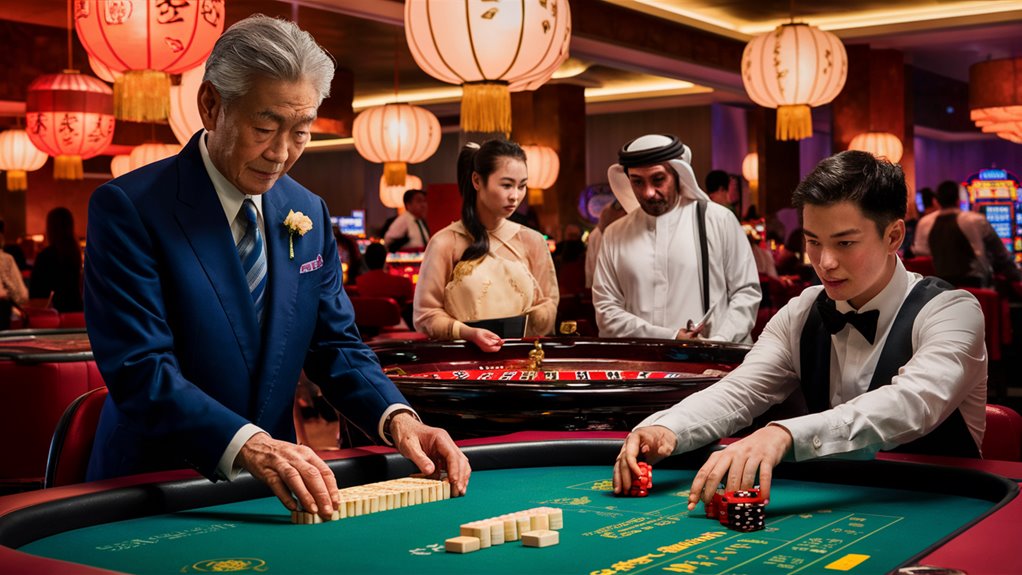
How Does Social Status Impact Gambling Behaviors Across Cultures?
Key Takeaways
- Gambling practices historically reflect social class divisions
- Modern casinos segment services based on wealth and status
- Cultural norms and professional circles influence gambling acceptance
Historical Class Distinctions in Gambling
Social status has historically defined gambling practices across different societies.
In ancient China, aristocrats engaged in exclusive games like liubo and mahjong within private chambers, while the working class participated in public cockfighting matches.
Victorian England demonstrated similar divisions, with the upper class frequenting members-only gambling establishments while working-class individuals placed bets in pubs and street corners.
Modern Casino Segmentation
Today’s gambling industry continues to reflect social hierarchies through targeted services:
- VIP Rooms: Exclusive spaces for high-net-worth clients in Macau
- Mass Market Areas: General access floors for tourists and locals
- Elite Venues: Monte Carlo’s strict dress codes and membership requirements
- Tribal Casinos: Community-focused establishments supporting local programs
Social and Professional Influences
Cultural context shapes gambling behaviors in several ways:
- Festival Gambling: Some cultures require gambling participation during celebrations
- Professional Networks: Certain gambling forms serve as business networking opportunities
- Social Stigma: Communities may view specific gambling types as indicators of poor judgment
- Cultural Taboos: Some societies completely prohibit gambling activities
These social norms and professional expectations continue to influence individual gambling choices and behaviors, creating distinct patterns across different socioeconomic groups and cultural contexts.
Cultural Superstitions in Gaming
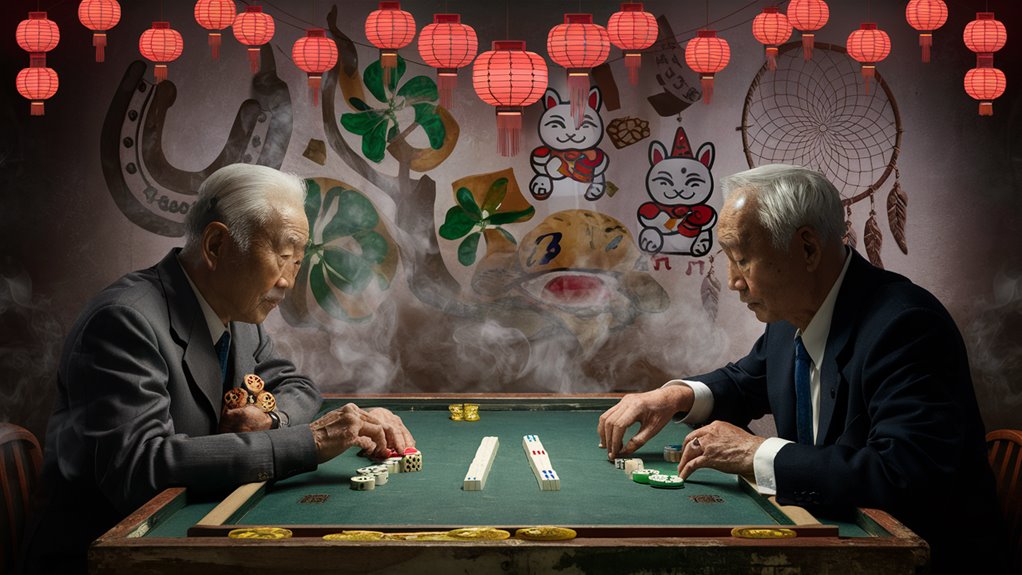
How Do Cultural Superstitions Impact Gambling Practices Worldwide?
Key Takeaways
- Number symbolism significantly influences casino design and player behavior across cultures
- Religious and spiritual beliefs shape game preferences and pre-gambling rituals
- Casino operators adapt their facilities to accommodate cultural beliefs and traditions
Number Symbolism in Different Cultures
Asian gambling culture revolves heavily around numerical significance, with 8 being particularly auspicious in Chinese culture due to its pronunciation matching “prosperity.”
Western gamblers typically avoid 13, considering it unlucky. This impacts casino architecture – Macau casinos often skip the 4th floor since 4 sounds similar to “death” in Chinese.
Cultural Lucky Charms and Rituals
Mediterranean players incorporate red clothing into their gambling attire, believing it protects against negative energy.
Native American gambling traditions emphasize spiritual preparation through cleansing ceremonies before significant gaming sessions.
Game Preferences Across Cultures
Cultural beliefs directly influence game selection patterns:
- Japanese players: Prefer pachinko, incorporating Shinto luck elements
- European players: Gravitate toward roulette, reflecting historical aristocratic gaming traditions
- Chinese players: Choose baccarat, considering it a game of destiny and fortune
Business Adaptations
Casino operators customize their offerings based on local cultural beliefs:
- Table layouts reflecting lucky numbers
- Floor numbering systems avoiding unlucky digits
- Game selection catering to cultural preferences
- Interior design incorporating culturally significant elements and colors
This cultural awareness in casino operations helps create comfortable gaming environments while respecting traditional beliefs and customs across different regions.
Modern Technology Meets Local Traditions
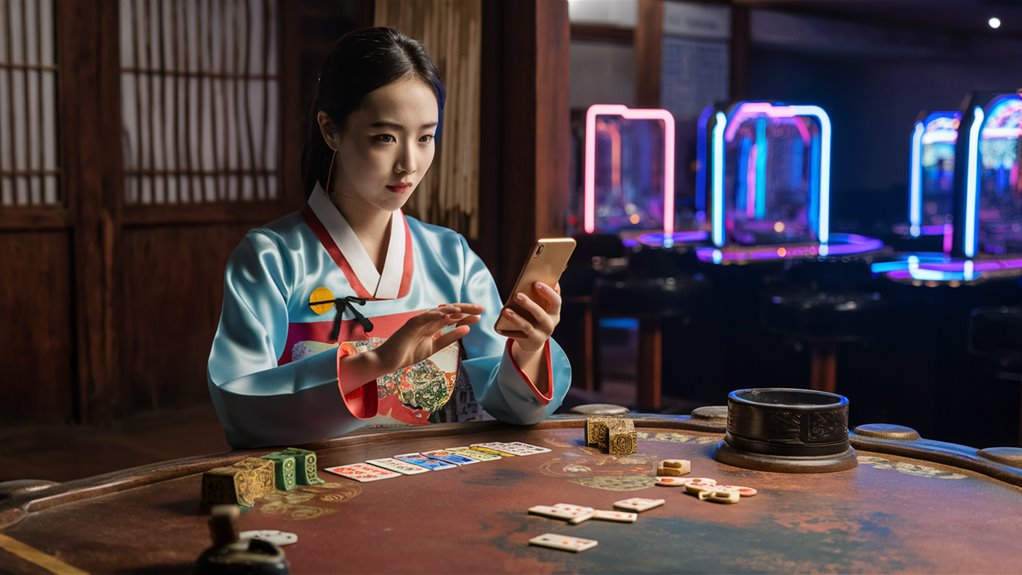
How Is Modern Technology Transforming Traditional Gaming Practices?
## Key Takeaways
- Digital platforms are integrating cultural gaming elements with modern technology
- Regional adaptations preserve traditional aspects while adding convenience
- Local payment systems and cultural symbols enhance user experience
The Fusion of Digital and Traditional Gaming
Digital technology is transforming traditional gaming practices across different cultures, creating hybrid experiences that maintain authentic elements while adding modern convenience.
Regional gaming platforms now integrate local traditions with cutting-edge features, ensuring cultural preservation alongside technological advancement.
Regional Gaming Adaptations
Asian Markets
- Traditional Mahjong and Sic Bo games available on digital platforms
- Japanese pachinko transformed into mobile applications
- Chinese interfaces featuring traditional symbols and lucky numbers
Latin American Integration
- Digital versions of neighborhood lottery systems
- Community betting pools adapted for online platforms
- Social gaming aspects preserved in digital format
Cultural Customization
- Cricket-themed gaming apps for Indian markets
- Region-specific payment methods integration
- Cultural symbols and traditional elements in user interfaces
- Local gaming mechanics adapted to digital formats
Technology-Tradition Balance
Modern gaming platforms accomplish more than simple content translation?�they create entirely new entertainment forms that:
- Honor traditional gaming preferences
- Implement convenient digital features
- Maintain cultural authenticity
- Support local payment systems
- Incorporate familiar gaming elements
This strategic blend ensures that while technology advances, the cultural essence of traditional gaming remains intact and accessible to modern users.
Gender Roles in Gaming Culture
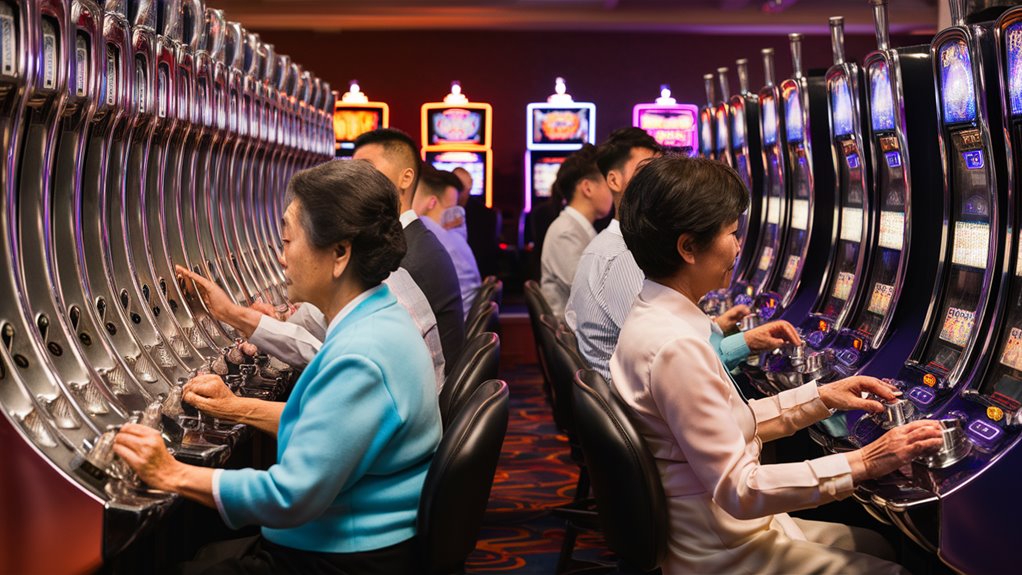
How Do Gender Dynamics Shape Modern Gaming Culture?
Key Takeaways
- Gender participation varies significantly across different gaming formats and cultures
- Online platforms are transforming traditional gender-based gaming patterns
- Cultural norms and economic factors heavily influence gaming preferences
- Digital accessibility is creating more inclusive gaming spaces
Traditional Gaming Patterns
Gender distribution in gaming spaces reflects distinct cultural and social patterns.
Western gaming environments typically show male dominance in poker rooms and sports betting areas, while slot machines and bingo attract more female players.
Asian markets present different dynamics, with strong female participation in traditional games like mahjong and pai gow.
Cultural Influences on Gaming Access
Cultural norms significantly impact gaming participation patterns:
- Conservative societies: Gender-segregated gaming areas
- Progressive regions: Mixed-gender gaming environments
- Traditional markets: Time-specific slots for female players
- Modern venues: Integrated gaming spaces
Economic Factors and Gaming Participation
Financial independence directly correlates with gaming engagement patterns:
- Higher economic autonomy leads to increased high-stakes participation
- Greater financial freedom enables diverse gaming choices
- Economic empowerment influences game selection preferences
- Market accessibility affects participation rates
Digital Gaming Revolution
Online platforms are reshaping traditional gender dynamics in gaming:
- Digital anonymity 실시간 배당률 변경 reduces social barriers
- Remote access enables broader participation
- Virtual environments create neutral gaming spaces
- Online platforms facilitate gender-neutral competition
Regional Gaming Variations
Different regions demonstrate unique gender participation patterns:
- Western markets: Traditional gender-specific preferences
- Asian markets: More balanced gender participation
- Emerging markets: Evolving gender dynamics
- Digital markets: Increasingly neutral participation patterns
The evolution of gaming culture continues to break traditional gender barriers, creating more inclusive and diverse gaming environments across all formats and platforms.
Family Values and Gambling Attitudes
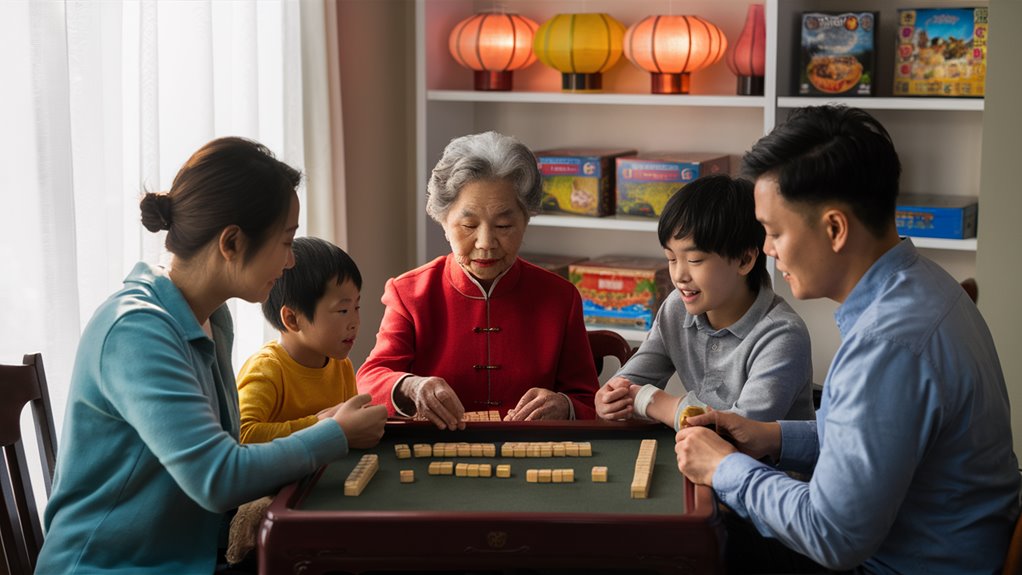
How Do Family Values Impact Gambling Attitudes Across Cultures?
Key Takeaways
- Cultural background significantly shapes family perspectives on gambling
- Religious beliefs play a crucial role in determining gambling acceptance
- Socioeconomic factors influence how families view gambling activities
- Traditional values affect gambling participation across generations
Cultural Differences in Family Gambling Views
Traditional family values significantly influence gambling attitudes across different cultural landscapes.
In Asian cultures, gambling intertwines with social traditions, yet families maintain strict regulations around gambling activities. Mahjong in Chinese households represents an accepted social activity, while casino gambling often faces resistance due to perceived threats to family stability.
Eastern vs. Western Family Perspectives
Western and Eastern family approaches to gambling reveal distinct cultural patterns:
- Western families: Focus on individual choice and personal responsibility
- Eastern families: Emphasize collective impact and family reputation
- Muslim families: Consider gambling haram (forbidden) based on religious principles
Socioeconomic Influences on Gambling Attitudes
Family economic status shapes gambling perspectives in several ways:
- Middle-class families: Often view gambling as recreational entertainment
- Working-class families: May see gambling as either:
- Potential path to financial improvement
- Dangerous risk to family stability
These viewpoints typically transfer between generations, establishing long-term cultural patterns in gambling behavior.
Impact of Religious Values
Religious beliefs create distinct gambling boundaries:
- Islamic families: Strong opposition due to religious prohibitions
- Buddhist families: Mixed views depending on regional interpretations
- Christian families: Varying perspectives based on denomination and cultural context
Modern Influences on Traditional Views
Digital gambling and changing social norms continue to reshape family attitudes:
- Online platforms challenge traditional family oversight
- Younger generations often adopt different perspectives than their elders
- Global media influence creates evolving attitudes toward gambling activities
